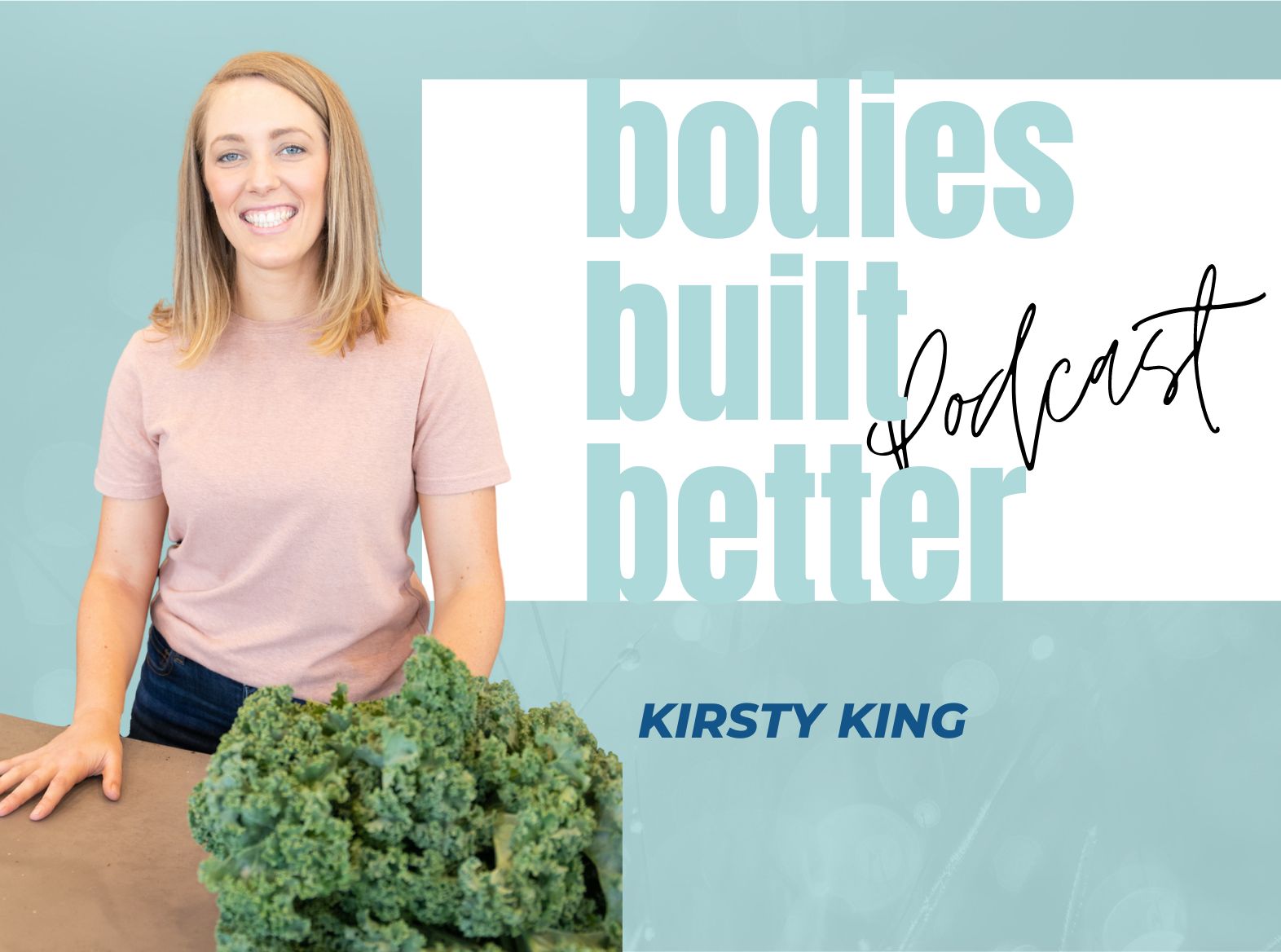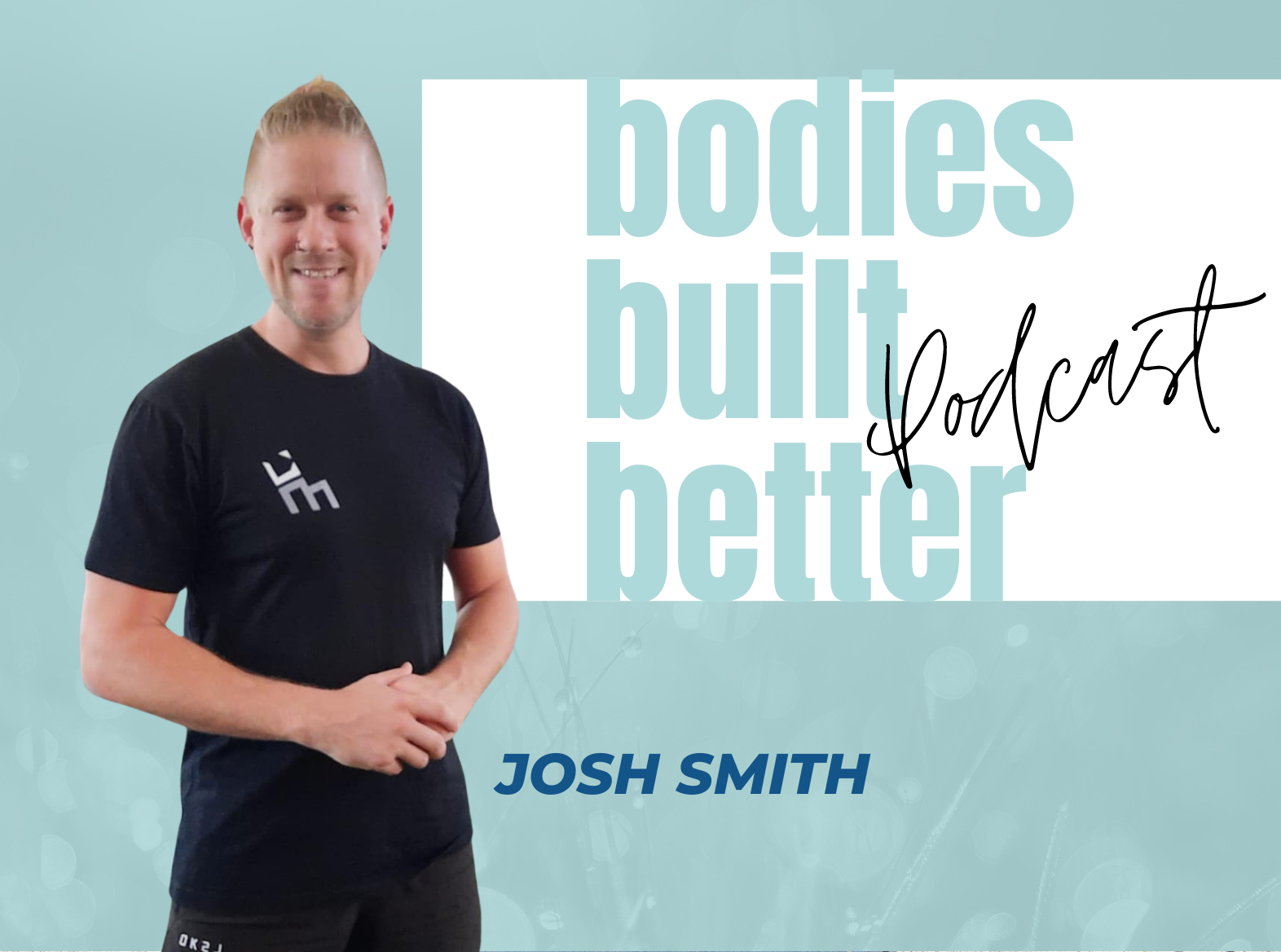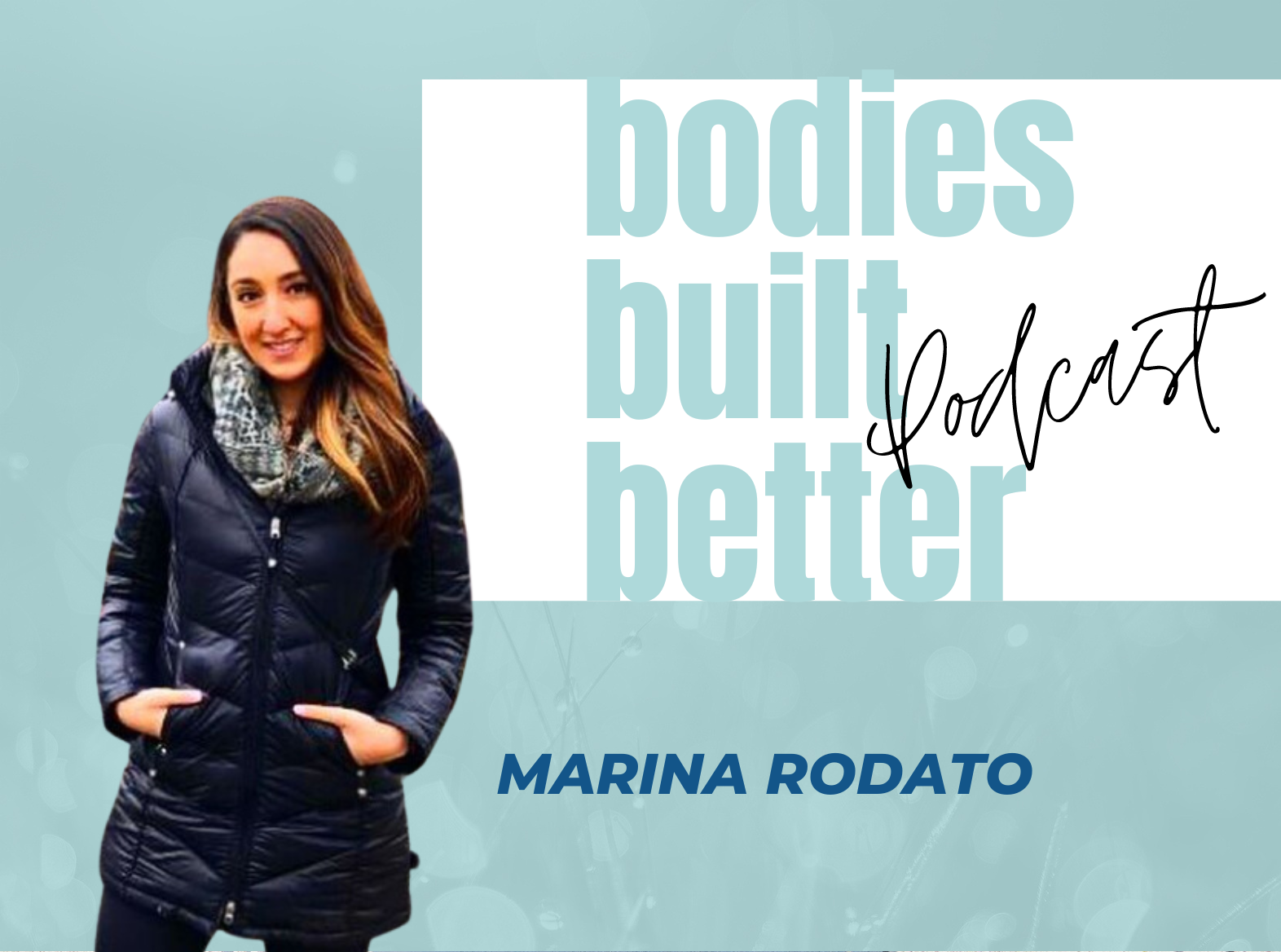The Gut Health Obsessed Naturopath
Jackie 3:00
Kirsty, thank you so much for chatting with me today. Welcome to the body’s build better podcast.
Kirsty 03:03
Thank you so much for having me. I’m excited to be here.
Jackie 03:06
It’s a pleasure. We’re talking all things gut health today. And I think gut health is one of those topics where you can learn something new, like forever. There’s always new research, there’s always something new to be learned. And I mean, specifically for me, it’s something that I kind of continually managing. And I know it’s certainly something that a lot of people are managing. So I’m excited to get into this conversation today. You are a naturopath and you describe yourself as a gut health-obsessed naturopath. So I’d really love to start there. What’s your journey into gut health and into naturopathy?
Kirsty 03:50
Yeah, so the reason I got into naturopathy is because of my own health issues. And that all stemmed from gut health, and just the imbalance in my, in my gut that was then causing so many other sort of embarrassing symptoms around my early 20s, you know, couldn’t go out without knowing where the bathroom was, and that sort of thing. So I was really controlled by my gut and wasn’t getting many answers from sort of Western medicine. That sort of area. So I was lucky enough to connect with a naturopath, which then started me researching and learning things about myself and what I could do to support myself. And then that led me to study naturpathy, and try all these things to support my gut health, which then now I share with other people. So that’s why I say I’m health-obsessed because I love talking about it. I love learning about it. And like you said, there’s always something new to learn.
Why Naturopathy Should Be A Part Of Your Healthcare Routine
Jackie 04:52
There absolutely is sometimes it can be overwhelming, which is why I love having these conversations with people like you, professionals. Okay, so let’s take a step back for a second and start with what is actually naturopathy because it’s a conversation that I have with people. And I feel like it’s still. It’s not that it’s woo-woo, because it’s no, you know, you’re doing four years of study or more, and I just would love to hear from you what is naturopathy and why should we be seeing a naturopath?
Kirsty 05:30
Yeah, for sure I say, naturopathy is it can be sort of a broad term. And it can be we would in Australia, it’s not actually regulated. So anyone can call themselves a naturopath. But you can do the four-year degree, which is what I’ve done as well. So I’ve done a Bachelor of Health Science in Naturopathy. So we normally say were clinical naturopaths. And that sort of takes into account the traditional healings, you know, traditional practices, as well as the modern-day science that we’ve got to back up these more traditional practices. So as a naturopath we look at the body as a whole and the person as a whole. So not only what’s going on in inside their body, what symptoms are presenting, but also what’s going on in their life, what they’re eating, what practices, they do daily, what habits they’ve formed, all sorts of things. So we’re looking at the whole person, and not just that they’re struggling with diarrhoea or constipation or bloating, we want to look at the person as a whole and then work out what’s contributing to them feeling the way they’re feeling, and find ways to overcome those things that are contributing to them feeling unwell.
Naturopathic Medicine: A Holistic Approach to Wellness
Jackie 06:47
Yeah, amazing. And there’s a few things you said there. Firstly, I had no idea that it was unregulated. So really important to check…
Kirsty 6:54
Yes.
Jackie 6:55
…qualifications of the naturopath that you want to see.
Kirsty 6:58
Definitely.
Jackie 6:59
And I just love this holistic approach to the whole person. It’s not just food, or what you’re doing. Like, it’s everything that you do in life. And and I think that’s where, unfortunately, the medical system kind of lags a bit. I mean, obviously, there is a space and time for it. But we really, it’s, that’s–we go there to sort of–I feel like when shit really hits the fan, and we kind of need immediate intervention. But with naturopathy, we really, it’s one of those things where you are addressing everything at all parts of our life. And that’s so important, because I think it’s easy to go, what’s the pill or tell me what foods to eat and kind of leave it at that. But it’s much more than that.
Kirsty 07:43
A 100% And that’s what–yeah, most people just want the pill to fix something. And that’s what Western medicine can be really good for. But unfortunately, they’re limited with what tools they have just like a naturopath is limited to what tools they have, and we can all work together to help our clients. So yeah, I think that’s–it’s not one or the other, we can all work together. But definitely, from–as a naturopath, we kind of tried to be a bit more preventative health as well. So not only looking after you when things– when shit has hit the fan is trying to prevent that from happening as well.
How Naturopathy Can Offer Different Support for Health Conditions
Jackie 08:18
Yes, I love that. So if someone feels like they’ve tried everything. What can naturopathy offer that is different?
Kirsty 08:27
Yeah. So I like this question because I can use myself and as an example, because I am a naturopath, I know a lot of things about how to support my body, but with my own health condition, like my own health. With my own health, I like to have a naturopath who supports me. And so they can look at everything from an outside point of view and not be sort of stuck in it. You know, sometimes you will have a certain symptom and automatically self-diagnosed with something. But then if you can talk to someone else, they will ask all the questions about what’s going on, not just about that one thing, and then they can start to put their perspective and their knowledge on what’s going on and help steer you in that right direction. So sometimes it might even be like, actually, you’re not eating enough, like you’re eating really well, but you’re not eating enough or you’re eating at the wrong times of the day or you haven’t drank any water today. So just almost like a little health coach to support you in focusing on the right things rather than all of the things.
Jackie 09:38
Absolutely. And as you said that was like a light bulb went off for me. I’m exactly the same like when something’s happening in my body in terms of, you know, fitness training, and when things don’t feel right, it’s like well, what will I do? I can’t actually treat myself and go do the stretches or the strength stuff. It’s a matter of going to someone else and that’s where my physio comes in and really does all of the things, breaks it down for me. I’d love to know. I feel like and correct me if I’m wrong, naturopathy or naturopaths, are you the only ones who use herbal medicines and flower essences?
Kirsty 10:19
So I’m pretty sure everyone can use flower essences like you can get them from most health food stores. But I know as part of our degree, we did a flower essence subject. But with herbal medicine, it’s herbalist and naturopath who can prescribe those high dose of herbs. So sometimes you can get health–small doses of herbs from health food shops and things like that. But a naturopath can prescribe herbs and formulate tinctures for you, specifically for you, and what you have going on.
The Benefits of Herbal and Flower Essence Tinctures
Jackie 10:53
Yeah, so I’d love to know more about that, because I find the herbs really interesting, and also the flower essence, like, where do they come into someone’s health journey? And how do you, but you just said, you know, we can get them but in low doses, why are they better in higher doses?
Kirsty 11:13
Yeah–and to be honest, they’re not always better in higher doses. But for some people, and if we’re trying to be really specific, for a person and their condition, we can go in a little bit higher, or we can tailor it to them. So someone might come in with gut issues, but they’re also really stressed out, or their immune systems really weak. So we can tailor make tincture to support them. So we might add some digestive herbs in there. But we can also support the immune system, or we can also support the nervous system. And so it’s specifically made for them, rather than–rather than them having to go out and buy, you know, five different bottles of things on or maybe not even realise that that stress or that immune system could be impacting their gut or vice versa. So that’s–that’s where it can be beneficial in seeing a naturopath they can help to help to be specific for you. And then also looking at those different levels or layers. So once again, someone might come in with a gut issue, but they’ve got this sort of limiting belief, or energetically, something’s holding them back. And that’s where flower essences can come in really nicely and just chip away in the background, sort of different energies that they’re holding on to. So some of the things might be you know, they’re just fearful. They’re fearful about knowing things, or unknowning things, or they’re worried about everyone else and not themselves, or they’re just exhausted, that there’s specific flowers, or those types of conditions or those makeups of people, and they just chip away gently in the background. And I always jokingly say that that’s the woo-woo medicine that I use because that isn’t that I know of there isn’t a lot of science to support the flower essences they are a little bit more of an energy-based medicine. But they can work wonders like I have big strong men come in, and they’re back for they’re tiny tincture of flower essences like they can’t get there through their day without them. Like it’s just the gentle support. And then other people don’t connect with it as much, but I love using them because they’re just so gentle. Anyone can use them, and they just gently work in the background while we work on whatever else is going on.
Jackie 13:45
I love that. I had no idea about the flower essence. So that sounds beautiful. It’s certainly something that resonates with me and I know you like you said it’s not gonna resonate with everyone.
Kirsty 13:56
Yeah.
Jackie 13:57
Do you think that if–I mean that type of person is going to be harder for the essence to have an impact or benefit because the kind of the mind is shut off to the benefits of that or…
Kirsty 14:10
Sometimes but sometimes I do get people who are very sceptical, but they’ll do it and then they’ll notice a difference so I think you definitely do have to be open to things because the power of the mind is you know, that’s even if I gave them sort of a saline solution and they convinced themselves that was poisoned it’s gonna make them sick, you know? Or yeah, you know, if you convince yourself that something’s going to upset you then it probably will even if it’s just water so yeah, definitely the mind plays a part but I think the flower essence also helped to break that down a little bit they also just chip away yeah, really a really good one just you can do over the counter is the Rescue Remedy. Even I think well, worse, was selling it for a while. I don’t know if they still do. But yeah, that’s just such a good little one to keep with you, and if you feel that overwhelm, or anything come in just a few drops under the tongue, and it can just help ease. Yeah, just take a little layer off a little bit. Like if you sniff essential oils or something, it just helps you feel a little bit more relaxed, so you can better manage whatever’s going on in your life.
Jackie 15:19
Yeah, absolutely. It’s something that I actually take for when I fly, because I’m not the brightest flyer.
Kirsty 15:26
Yeah, a tad bit, yeah
Jackie 15:27
Just that little bit of help.
Kirsty 15:27
Yeah.
The Role of the Gut Microbiome in Health and Wellness
Jackie 15:30
But it’s nice. Yeah. So tell us about the gut disorders. I feel like this is a loaded question here. Because I feel like there could be many out there in ones that we probably haven’t even discovered. But tell us, I guess, the common gut disorders and how I guess that challenges us?
Kirsty 15:48
Yeah, so the most common thing I guess I see in clinic is an imbalance in our microbiome. So that can be for lots of different reasons. But yes, it’s basically an imbalance in the good and bad bacteria. And often, we always think that it’s the bad bacteria or parasites that are contributing to gut imbalance. But a lot, a lot of the times, it’s not enough of the good bacteria, or the balance of good bacteria in our gut, so we’re lacking in that, and then our gut can’t do its job properly. So they’re the more common things I see. But also see things like chronic constipation, and that can be contributed to by stress. Because if we’re stressed, even if it’s just sort of that go, go go, sitting in that fight or flight nervous system, it can stop the movement of our gut. And our gut needs to sort of continue to move to push things through and out. So for stress that just stopped. So that can be a really common one in you know, modern day society when busy is successful, and what were looking for. And then it can be sort of more severe things like inflammatory bowel diseases like Crohn’s, ulcerative colitis. Yeah, those types of really, sort of more chronic and more of a genetic, I guess, component to it’s kind of already there. And then we’re supporting clients to reduce their symptoms and, and not have as many flare-ups.
Jackie 17:25
Yeah. Okay, so you said a genetic component, what, what is actually happening with something like the Crohn’s?
Kirsty 17:31
Um, so there can be lots of different things. So it’s not always that way. But generally, there is sort of a little bit more of a genetic makeup. But that’s when there’s an inflammatory condition going on in the gut, and different things can trigger it at different times. So it might be food related, it so might be sitting now you might be more predisposed to having a condition like this. But if you’re in a stressful situation, or you’re not eating the right foods, that’s when you really gonna feel the impact of the all the symptoms of it, where if we can help educate a person about their condition, and then give them the right tools to support themselves, and then not going to have as many flare-ups. And you know, those flare-ups are terrible, they can take control of your whole life, it’s not only just severe pain, it’s also has a mental health aspect to it. So if we can help people to understand their conditions, and then learn to support themselves in the right way, then that quality of life is improved. And potentially, in some cases, then there’s not as need for like different medications. So you know, or fewer medications, rather than just adding so many on and then they’re in there forever. Yeah
Jackie 18:47
And with the conditions, this might sound like a silly question, but being the gut, could we potentially I guess treat them all in the same way if we were to look at our nutrition?
Kirsty 19:06
Uh, not–I don’t think we can treat everyone exactly the same because some people have different food sensitivities, or different triggers for their gut. But I think the basics the foundations are all generally the same you know, trying to eat as well as possible. Avoid processed and inflammatory foods, drinking water, staying relaxed and or managing stress and trying to switch your body into that rest and digest nervous system rather than being in fight or flight all the time. Getting sunlight getting fresh air, all those things. So I think their foundations and the basics are all the same, but they’re definitely not everybody just is like alright, you need to go on this diet you need to avoid these foods. But there are some common things that we can definitely try first and then we can narrow it down into more specific things.
Where to find Kirsty:
Website: www.kirstyking.com.au and www.gutrecoverycentre.com.au
Instagram: @gutrecoverycentre @kirstykingnaturopathy
Facebook: @kirstykingnaturopathy
If you enjoyed this episode of The Bodies Built Better Podcast please hit SUBSCRIBE and share it with your friends.
Head over to The bodes built better podcast page – https://jackietann.com/the-bodies-built-better-podcast/
Follow @jackietann_rmt and @bodiesbuiltbetter on Instagram
Got questions, comments, or feedback? Get in touch via the above social media handles.







